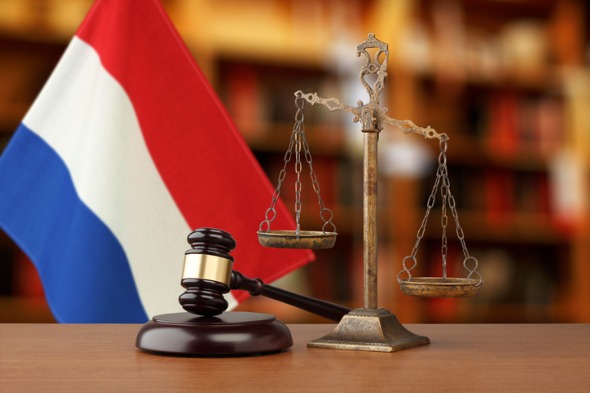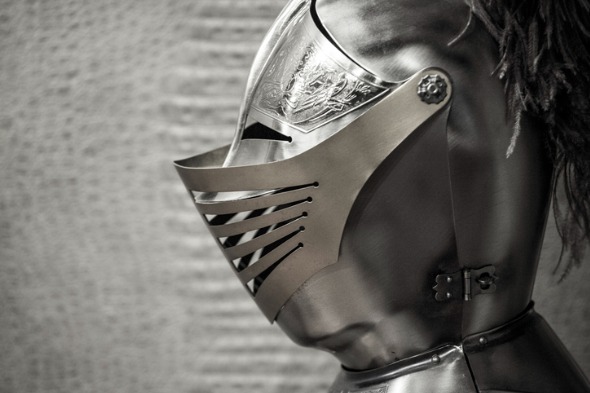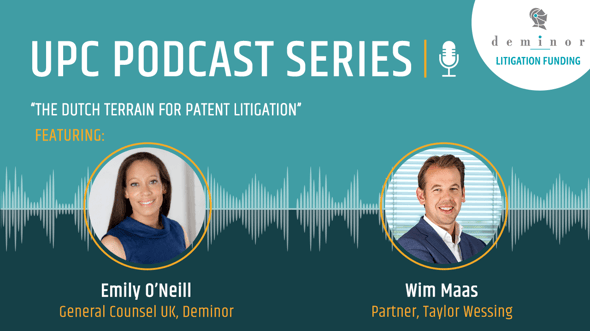In this podcast series, Emily O'Neill General Counsel UK and Global Intellectual Property lead for Deminor Litigation Funding, undertakes interviews with global professionals to understand the implications of the new Unified Patent Court (UPC).
Deminor welcomes you to join this conversation as we summarise the key elements of the conversations between Emily O'Neill and these experts, as captured in the podcast transcripts below.
What is the UPC?
The Unified Patent Court (UPC) is a new European court system designed to harmonise and simplify the patent dispute landscape in Europe.
The UPC was established in order to provide a unified patent enforcement system with jurisdiction over ratifying EU member states. Countries that are Member States of the European Patent Convention (EPC) but are not EU member states cannot join the Unitary Patent or Unified Patent Court. As a unified court with a multi-state jurisdiction, the UPC hopes to be faster, more efficient and more cost-effective in resolving patent disputes.
The UPC's structure is made up of a Court of First Instance that is divided into central, local and regional divisions. Its central divisions are located in Paris and Munich. The third seat of the central division was originally assigned to London. The Italian Foreign Office published a press release that an agreement has been reached with France and Germany to set up a branch of the Central Division in Milan. This agreement now needs to be approved by the other UPC contracting states during the next meeting of the Administrative Committee in June 2023. The press release states that the Milan court is in the process of being set up and will be operational within the next year. In the interim, the Presidium of the UPC decided, that initially, the Paris and Munich central division seats will share this caseload. Cases concerning human necessities are assigned to Paris and those involving chemistry and metallurgy to Munich for now.
The UPC’s Sunrise period launched on March 1st and allowed patentees to opt out of the exclusive jurisdiction of the new system to take effect from the court coming online on 1 June. Approximately 460,000 European patents and patent applications have been opted-out during Sunrise. Opt-outs are still possible now and at least during the 7-year transition period, unless proceedings are pending in the UPC, and will take effect once filed.
However, this is a new and untested forum, located in civil law jurisdictions but with elements of common law such as disclosure, cross-examination and adverse party costs. Notable jurisdictions such as the UK and Spain are not within the UPC - How will companies mitigate their commercial litigation risks in this environment?
Podcast Preface:
Deminor General Counsel UK, Emily O'Neill (EON), speaks with Dr. Wim Maas, Partner at Taylor Wessing. Wim heads Taylor Wessing’s Intellectual Property and Disputes & Investigations teams. Wim works with national and international clients facing patent litigation in the Netherlands and other jurisdictions. He has nearly two decades of experience in IP law and specialises in patent litigation cases in technical areas such as technology, engineering and life sciences.
In this interview with Emily O’Neill, Wim offers his perspective on the risks and opportunities presented by the forthcoming UPC, including his views on how it will compare to the US system.
Podcast Transcript:
EON - The UPC offers an opportunity to litigate on a pan-European basis. How is Taylor Wessing organising its teams to litigate UPC cases?
WM - We are approaching it from an international perspective from the get-go, by making sure the teams consist of people from different nationalities and backgrounds. We believe that this system is already a compromise of all the best features from the different European countries, so it would be a mistake to only approach it from a Dutch perspective if a case was brought before the local division in the Netherlands, for example.
We will bring in international patent litigators from Germany or France or the UK. Because even though the UK is not in the UPC, the UK was very important when the system came into existence, and there are English features within it.
Bringing people in from different nationalities and different backgrounds is the way we are going to do this at Taylor Wessing.
EON - Who are the Dutch judges that will be part of the UPC? And what do you think their approach will be to the new set of rules?
WM - The judges we have in the system are very experienced, and their names are Rian Kalden, Peter Blok, Edger Brinkman, and Margot Kokke. The first two I mentioned, Rian Kalden and Peter Blok, will be at the Court of Appeal and Rian Kalden is also in the Presidium. And the last two names I mentioned, Edger Brinkman and Margot Kokke, will be in the local division in the Netherlands.
All these judges are extremely experienced, so the fact that they made the cut says a lot about the system, and it means that the judges take it very seriously. For me, the fact that they have committed to this system is also a vote of confidence in it.
I really see the system succeeding because as I’ve learned from my colleagues in other jurisdictions, the best patent judges from their countries are also in the system. The UPC will only be successful if the quality is safeguarded, and I think a major part of bringing quality to the courtroom is the judges who are presiding over the cases.
I'm quite confident that these judges will approach the system in the way I would like them to do it, and that's from an international perspective, recognising that a pan-European solution is the way forward. Hopefully, it will also bring bigger cases to Europe, because we now have a one-stop shop solution. With one case you have an injunction because all the judges have already said that they will grant injunctions. Even though there's a proportionality test in it, they will grant injunctions. So we’ll have one pan-European injunction with only one case, and then I think we will really have something to offer, compared to the US system and also other systems, like litigating in the UK, Asia or South America. I think a jurisdiction with 330 million inhabitants in itself can be quite valuable to patentees.
It’s also important to stress that the system is making it possible to litigate quickly. If you win the case, it will lead to a judgement within 12 to 14 months, which will make it quite patentee friendly.
I'm quite sure that these patent judges will also invalidate rubbish patents. I don't have any concerns about that. But I do also think these judges will understand that this system has to facilitate patentees who want to invoke their patents. Because if they don’t do that, and make it an effective, quick solution, then I think this system will not succeed. So I think the approach of all these judges, including the Dutch judges we just talked about, will be facilitating quick decision-making at a high level of quality.
EON - How are Dutch companies viewing the UPC versus litigating in the national courts?
WM - I think it depends on the size of the companies. The quality of the IP departments and the people working in those departments are also among the factors weighing in here. But I think in general, Dutch companies will perceive the UPC as a positive step. Companies that have European patents, particularly less experienced companies, are often surprised that you have to litigate a patent in every country to get what you want - and that's a decision on infringement, which would apply to the entirety of Europe. So that in itself, makes sense for everyone.
Less sophisticated companies who have patents, such as larger SMEs, who can often be quite substantial in turnover, definitely understand that this is the better system on paper. I also believe it will be a better system in practice, but that's something we of course, still have to see. But on paper, nobody can argue that this is not a better system.
Turning to the more sophisticated companies, if you have patents, for instance, in the life sciences or pharmaceuticals sector, and you’re protecting your blockbuster, you might not like the feature of having to deal with a central revocation at the UPC Central Division. Because if you lose the case, your patent can be invalidated for every country. Of course, the more it costs to kick out your patent, that could make it more difficult for people using your invention to invalidate your patent. From that perspective, companies could see this system as a risk. But that's very specific to the sector and the company.
At the same time, in the pharmaceutical industry, generics will not be very happy with the system because it can also mean that they are being blocked from the market with one injunction, after only one case. With respect to their launching strategy, this could be a serious risk as well. You can't say that the UPC system doesn’t facilitate patentees in the life sciences sector, because it really does. I think innovative pharmaceutical companies will see the system as interesting and another tool in the toolbox.
As I said, depending on various factors, such as the size of the companies, the sophistication of the people in the IP department, the sector in which the company is active, they will view it differently, but that's on a granular level. In general, I think Dutch companies will see the logic of the system and will be happy with this new solution for a problem that all patentees have if they are confronted with an infringement.

EON - You mentioned that the view of the UPC will depend on the size of the company and its IP department. Part of the reason for implementing the UPC was to simplify litigation in Europe. Do you think that SMEs will benefit from the system given that it's going to be more expensive than a single jurisdiction?
WM - Yes, I think that SMEs will benefit from the system. Often, sizable SMEs that do business in Europe, won’t just be operating in the Netherlands. If they have to litigate in the Netherlands, Germany, Belgium and any other country where they do business, I'm quite sure that will be more expensive than the UPC.
What I do not like about the UPC is the fact that it has to be self-financed, and therefore you also see high court fees. In Germany, they are used to this because of the system they have. But from a Dutch perspective, it is quite costly if you look at court fees. I don't see any reason why it should be more expensive than simply litigating in the Netherlands where you also have infringement and invalidity trials in one case, no bifurcation.
However, at least it is a choice. If you defend an SME asserting a patent in the UPC, they have a choice regarding how you go about it. Of course, if you have a lot of experts, and you want to have the other side cross-examined etc., proceedings will quickly become more expensive. But still, there is a choice here.
On the whole, I think many companies will be very happy with it, because in one case, getting your competitor to remove his product from the market, is far superior to litigating in just the Netherlands or another jurisdiction.
What would it mean if you were sued as an SME company? For the UPC that could be more difficult, because the system is composed in such a way that the patentee is in the driver's seat, and therefore it could amount to more costs than if you compare it with only litigating in and defending against a claim of a patentee in a national proceeding. I think it could quickly be more expensive.
In conclusion, will SMEs use the UPC system? To my mind, there’s no doubt that they will use it. It's far superior to obtaining solutions in national cases, which can also be similar because you're in the driver's seat there too. But if you are being sued in the UPC court, you won’t like it as I think it will be more expensive. So is it an SME-friendly system? Well, that depends on whether you're being sued or whether you are the asserting party!
EON - Now that the sunrise period has ended, we're seeing the statistics around opting out. Who do you think will be the early litigants in the UPC?
WM - I think the early litigants will be those companies who now have a patent infringement action in the planning. Because if I know I have a client who's actually pursuing proceedings against an alleged infringer, then I have this additional tool in the toolbox. Those will be the first litigants to look at it, and they might say okay, that's interesting to have a decision on the merits 12 to 14 months from now. I know what the court fees are, I know what the spend will be for my lawyer, I know what I will have to pay approximately if I lose. So I think the first litigants will be the ones who actually have a case now. Maybe they will wait until the system starts, or maybe they have something in preparation already. And that is industry agnostic. That's what I believe.
Then, you could also look at certain industries, who are maybe not the early litigants, but simply companies from the industry that will probably use the system the most, and I think that is electronics and also mechanical engineering.
I think pharmaceutical companies less so, but that depends on the opt out because if, for instance, some of the patents which generic companies think should be invalidated are not opted out, they will also use the system, and they will try and facilitate their launch strategies to go after these not opted out pharmaceutical patents.
I think that is the mixture of litigants. We will see a very industry-agnostic approach, simply because these parties now have a claim and will consider this a new tool in the toolbox. Then it won’t depend on timing, but I expect the interest of electronics and mechanical engineering companies to be front runners, compared to pharmaceutical companies who will be looking at the system for a bit longer before they actually start using it.

EON - Let's talk about damages. There's some discussion around whether the court will be able to award damages before its start date of 1st June. You've talked about the UPC being a real alternative where higher damages awards will be quite common or possible. Can you comment on the likely level of damages and the limitation period?
WM - I think we will see many more damages cases than we typically find in national proceedings in Europe. Damages proceedings in continental Europe are actually not often litigated at all. I've got 20 years of experience in patent litigation, and I never did one damages case, which I think says a lot. It’s simply because it's not really interesting to pursue those cases in the Netherlands because there is a very simple methodology, on the basis of which, you can calculate the damages. It is often the surrendering of profits, in the end, parties will typically settle with no need for a judge.
It's far less interesting than in the US, for example. Everybody will be aware of the differences there, from the punitive damages the US has, and the jury trials.
It all depends highly on the system you are litigating in. Typically, continental Europe and the UK, are less interesting in terms of damages, so these jurisdictions don’t see a lot of damages litigation going on. These cases are simply settled.
Do I think this will be different within the UPC system? I think it will because I think the amounts will be so much higher, that in the end, it will be worthwhile to litigate. The profits for only the Netherlands could be small, but if you are given an injunction, and you are also ordered to pay damages, for the entirety of Europe, at least where the patent is, that is raising the stakes in terms of damages claims. So much that I believe that there will be more action on damages.
If it is a classical European patent, with a unitary effect, then it's only relating, of course, to the damage suffered in the countries where the patent was validated, but also certainly for the new unitary patents, the jurisdiction in which you can claim damages will be so much bigger. In theory, 300 million people can be affected. I don't have a crystal ball, but I really think this will make a difference.
I think we’ll see separate damages suits after the injunction proceeding on the merits. With separate damages claims, the stakes are so much higher. Let’s do the maths - if it costs a million in fees, or 500,000 in fees, to try and get something off the entire damages claim of 30, 40, 50, 60 million, or even higher for such a big jurisdiction, it is more worthwhile to litigate. So we are preparing for that, and we’ll have to involve people internationally, who have more experience in that. As I said, I didn't do any cases of damages and patent suits in 20 years. Of course, I know how to calculate the damages based on the case law. But I can imagine that this is a different game, to which we will bring people from arbitration practice or maybe from commercial disputes practices, in order to really become experts in this field as well.
EON – The UPC is going to bring about a huge change to patent litigation in Europe. Are you excited?
WM - Yes, I am really looking forward to the system. From my own personal perspective, I would like to get a piece of the action! I think Taylor Wessing will be able to play our part for our clients, so I'm pretty confident that I will get what I want to be able to play in this new system as well. So I'm really looking forward to it, and hopefully, when the system starts on 1st June, it will also be a kick-off for us to do the first cases that we have been preparing now for a year. We thought it would never actually come.
For the last year we have been doing UPC training with clients, we have been training ourselves, we have been doing analysis and mock trials. When you’ve been training for a match for so long, you look forward to actually performing on the pitch, right? That is how we feel, and I think that probably applies to all patent litigators. When you look at LinkedIn, you see a lot of patent litigators, talking about the UPC, all hoping to get a piece of the action, and I really believe that Europe will see a lot more action. It’s not simply a case of dividing the cookie we have, but it will increase the size of the cookie for everyone. I really think it will bring more and bigger cases to us, and also from the US.
Right now, you see a lot of action going on in the US, which will never go to Europe, and I think that will change. That’s me looking into a crystal ball, but that's what I expect. I also think that US law firms will find the system interesting. It's never really worked well for them to set up an office in, for instance, the Netherlands, and be involved in patent litigation in only one or a few European countries. But with the UPC, it could be worthwhile for them to set up a law firm somewhere in Europe to do UPC cases for their own US clients. So I really believe there will be more coming from the US, but maybe also from China and other Asian countries.

UPC Podcast Series - Next steps and further information:
Thanks for joining Deminor's UPC Podcast Series as we deep dive into the ins and outs of the new Unified Patent Court.
Keep a look out for our upcoming conversations as Deminor General Counsel UK and Global Intellectual Property lead, Emily O'Neill speaks with several more experts to get their insights on the UPC.
If you would like to connect with Emily or Wim on LinkedIn, please click on the links below:
Emily O'Neill - Deminor General Counsel UK and Global IP lead
Wim Maas – Partner, Taylor Wessing
***
Further Reading:
- https://www.deminor.com/en/case-studies/co-funder-proposes-sharing-of-litigation-funding-risk-to-leverage-deminors-in-house-due-diligence-capability
- https://www.deminor.com/en/case-studies/financing-assertion-of-patents-protecting-manufacturing-processes
- https://www.deminor.com/en/case-studies/telecoms-patent-assertion-multi-jurisdictional-campaigns
- https://www.deminor.com/en/case-studies/canadian-innovative-start-up-preparing-for-a-david-v-goliath-litigation-funding-battle
- https://www.deminor.com/en/case-studies/whats-the-risk-assessing-the-risk-of-counter-assertion-by-the-defendant-in-patent-litigation
- https://www.deminor.com/en/case-studies/overstepping-the-mark-litigation-funding-trade-mark-infringement
- https://www.deminor.com/en/case-studies/lights-camera-action-recovering-damages-for-infringement-of-rights-in-a-short-film
- https://www.deminor.com/en/case-studies/recovering-damages-for-stolen-software-through-litigation-funding
- https://www.deminor.com/en/case-studies/funding-in-the-pharma-sector-/-investing-in-a-case-where-litigation-is-already-ongoing






